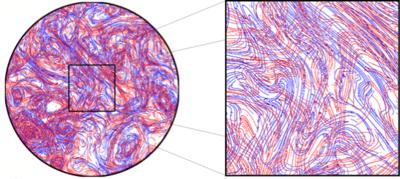Having just finished Michael Nielsen's book "Reinventing Discovery", I find myself wondering if there are ways that pure mathematics research can engage the public in the way that GalaxyZoo or Foldit have in astronomy and protein science respectively. In other words, to break up large-scale research problems into manageable chunks which can be tackled by massed ranks of amateur enuthusiasts (citizen scientists).
Let me give you three examples of what I have in mind (which each have their own drawbacks)
One obvious historically relevant possibility which comes to mind would have been getting people to check cases of the four-colour theorem. This could obviously be done by computer, but perhaps if it were done by hand(s) the proof would be less controversial. The main drawback is that the proof has already been done (by computer) and people would maybe feel like they were wasting their time because they could be replaced by a computer. A good citizen science project would make crucial use of the fact that its citizens were human.
Perhaps, given a suitably programmed piece of software for manipulating Kirby diagrams, amateurs could be let loose on checking new potential counterexamples to the smooth Poincare conjecture in dimension 4 (like the recent Nash ones which were found to not be counterexamples by Akbulut). The disadvantage would be that such software would be pretty hard to write (I imagine).
Donaldson's Lefschetz fibration theorem effectively reduces symplectic geometry in 4-dimensions to study of the mapping class groups of surfaces. In particular it would be useful to find new factorisations of the identity in mapping class groups into words of right-handed Dehn twists (these correspond to Lefschetz fibrations on closed symplectic manifolds). A piece of software allowing people to play with mapping class groups might help find such interesting factorisations. The drawback would be that this definitely feels like searching for a needle in a haystack. The beauty of GalaxyZoo is that each click you make is contributing positively to the project, even if you're not finding a new type of galaxy. With a needle-in-a-haystack problem, users would get frustrated very quickly. It's also possible that a computer would perform better.
So my question is:
Can we collectively come up with some reasonable (proto)-propositions for research projects in pure mathematics which would be amenable to citizen science? Ideally these would be both useful for pure mathematics, and intellectually engaging and rewarding for the citizens (preferably not searching for a needle in a haystack).
Edit: Just to be clear, I am interested in specific suggestions for mathematical problems which could be amenable to solution by 'citizen science' and I don't want to open up a discussion about whether this is desirable or sensible: that's not part of MathOverflow's remit. A priori, it's not even clear to me that such mathematical problems exist and I would be interested to hear if more imaginative people than me can come up with suggestions.

